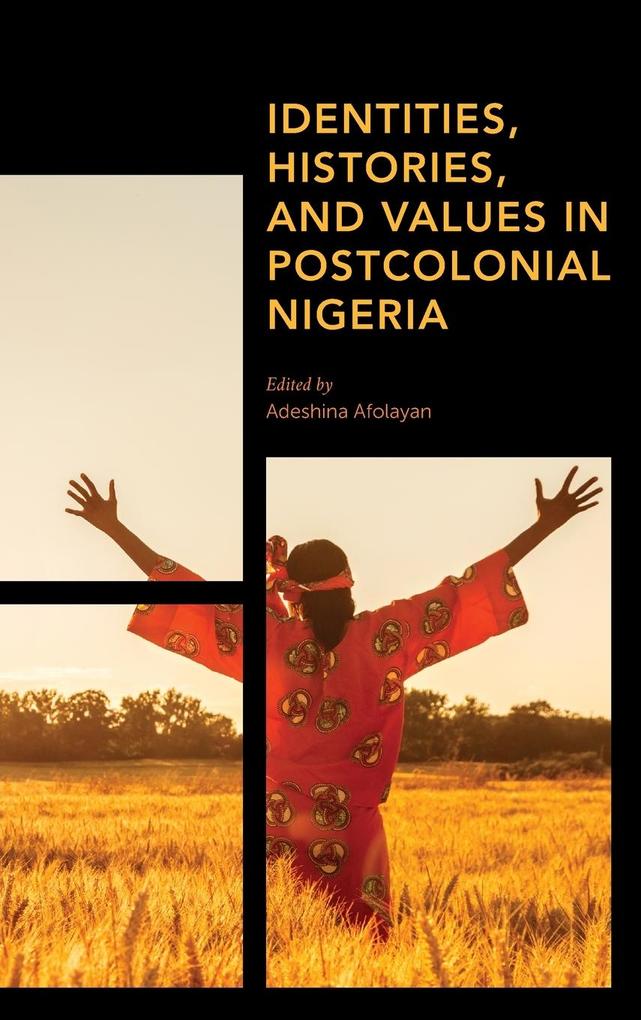
Zustellung: Mi, 18.06. - Sa, 21.06.
Versand in 1-2 Wochen
VersandkostenfreiBestellen & in Filiale abholen:
This collection offers new perspectives that explore and reshape new directions around which postcolonial Nigeria can make progress around identities, values and histories.
Inhaltsverzeichnis
Introduction: Performing Postcoloniality in Nigeria, Adeshina Afolayan
Part I
Chapter 1. Wole Soyinka: A Public Intellectual, His Publics and Postcolonial Modernities, Sanya Osha
Chapter 2. Informality and Patriotism in the Nigerian Postcolony, Adeshina Afolayan
Chapter 3. Ajala as Metaphor of the Nigerian Travel Culture: Myths, Legend and Memory(-ies) of the African Abroad, Oluwaseun Abimbola
Chapter 4. Language Games and the Inequality of Gender: Feminist Postproverbials and the Yoruba Language, Olayinka Oyeleye
Chapter 5. Ethnicity and Fluid Identities in Nineteenth Century Lagos, Mary Aderonke Afolabi
Chapter 6. The Future of Du Bois: Consciousness, Citizenship, and Epistemology in Nigeria/Africa, Nimi Wariboko
Part II
Chapter 7. Determinism and Human Agency in Shola Allyson-Obaniyi's Gbe j F'ö ri and A kosi le , Lawrence O. Bamikole
Chapter 8. Digital Appropriation, Youth Culture and Cybercrime in Emergent Yoruba Bollywood, Olajide Salawu
Chapter 9. "The Other Room": Politics, Sex and Power in Shoneyin's The Secret Lives of Baba Segi's Wives, Ofure O. M. Aito and Omolola A. Ladele
Chapter 10. Walking Backwards: Prediction of a Failing "Postcolonial" Nigeria in Kunle Afolayan's October 1, Abimbola Iyun
Chapter 11. Waka into Bondage: Ndidi Dike's Performance Installation and the Creative Reenactment of the Badagry Slave Trade Route, Kunle Filani
Chapter 12. Gboju Nbe! Urban Slangs as Sociolinguistic Expressions in Selected Nollywood Films, Mojisola Shodipe
Chapter 13. New Englishes and Nigeria's Linguistic Ecology: Nigeria's Newscasters' Stress Pattern as Model for Standard Nigerian English, Julianah A. Akindele
References
Part I
Chapter 1. Wole Soyinka: A Public Intellectual, His Publics and Postcolonial Modernities, Sanya Osha
Chapter 2. Informality and Patriotism in the Nigerian Postcolony, Adeshina Afolayan
Chapter 3. Ajala as Metaphor of the Nigerian Travel Culture: Myths, Legend and Memory(-ies) of the African Abroad, Oluwaseun Abimbola
Chapter 4. Language Games and the Inequality of Gender: Feminist Postproverbials and the Yoruba Language, Olayinka Oyeleye
Chapter 5. Ethnicity and Fluid Identities in Nineteenth Century Lagos, Mary Aderonke Afolabi
Chapter 6. The Future of Du Bois: Consciousness, Citizenship, and Epistemology in Nigeria/Africa, Nimi Wariboko
Part II
Chapter 7. Determinism and Human Agency in Shola Allyson-Obaniyi's Gbe j F'ö ri and A kosi le , Lawrence O. Bamikole
Chapter 8. Digital Appropriation, Youth Culture and Cybercrime in Emergent Yoruba Bollywood, Olajide Salawu
Chapter 9. "The Other Room": Politics, Sex and Power in Shoneyin's The Secret Lives of Baba Segi's Wives, Ofure O. M. Aito and Omolola A. Ladele
Chapter 10. Walking Backwards: Prediction of a Failing "Postcolonial" Nigeria in Kunle Afolayan's October 1, Abimbola Iyun
Chapter 11. Waka into Bondage: Ndidi Dike's Performance Installation and the Creative Reenactment of the Badagry Slave Trade Route, Kunle Filani
Chapter 12. Gboju Nbe! Urban Slangs as Sociolinguistic Expressions in Selected Nollywood Films, Mojisola Shodipe
Chapter 13. New Englishes and Nigeria's Linguistic Ecology: Nigeria's Newscasters' Stress Pattern as Model for Standard Nigerian English, Julianah A. Akindele
References
Mehr aus dieser Reihe
Produktdetails
Erscheinungsdatum
03. Februar 2021
Sprache
englisch
Seitenanzahl
276
Reihe
Africa: Past, Present & Prospects
Herausgegeben von
Adeshina Afolayan
Verlag/Hersteller
Produktart
gebunden
Gewicht
554 g
Größe (L/B/H)
235/157/19 mm
ISBN
9781786615626
Entdecken Sie mehr
Bewertungen
0 Bewertungen
Es wurden noch keine Bewertungen abgegeben. Schreiben Sie die erste Bewertung zu "Identities, Histories and Values in Postcolonial Nigeria" und helfen Sie damit anderen bei der Kaufentscheidung.


























